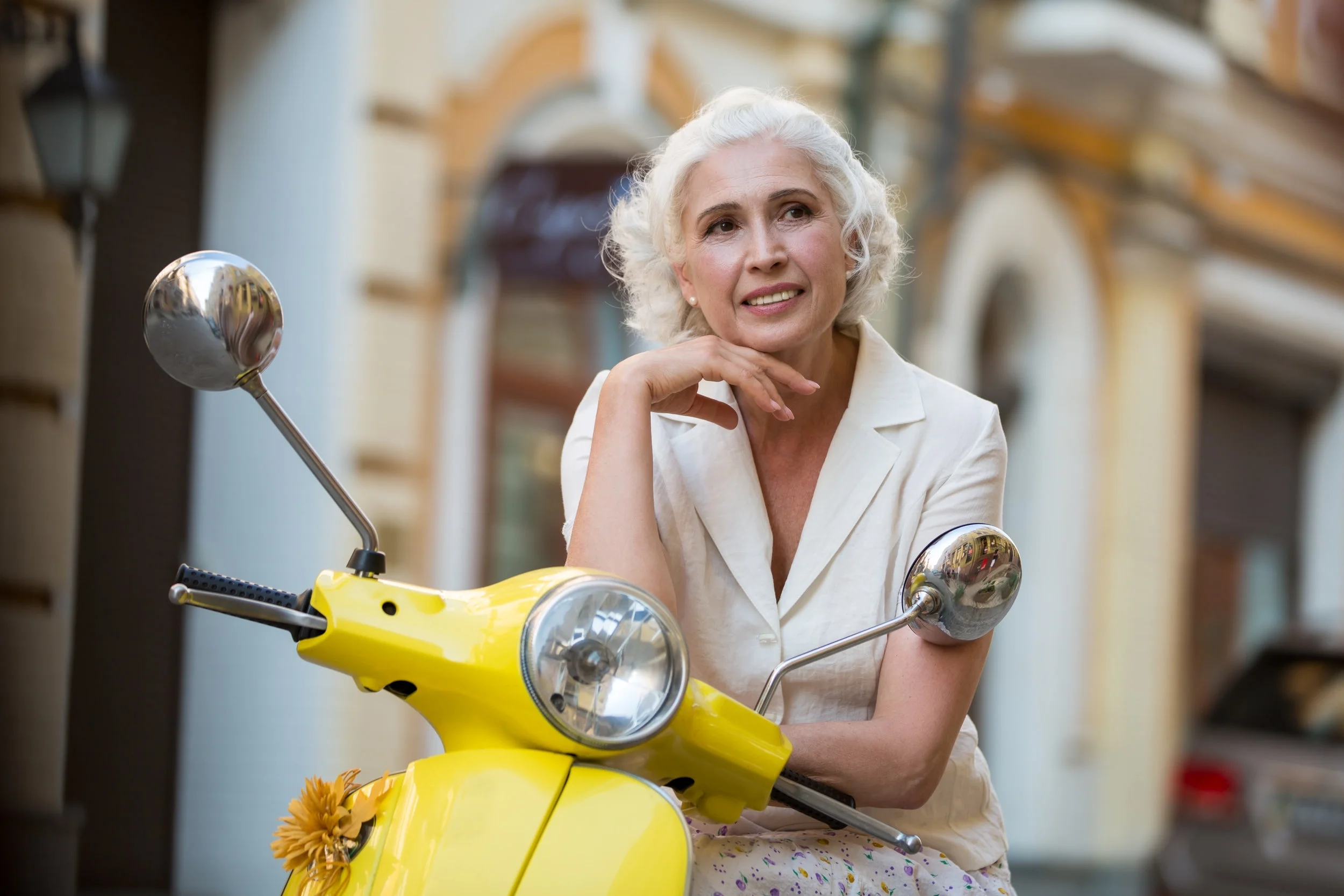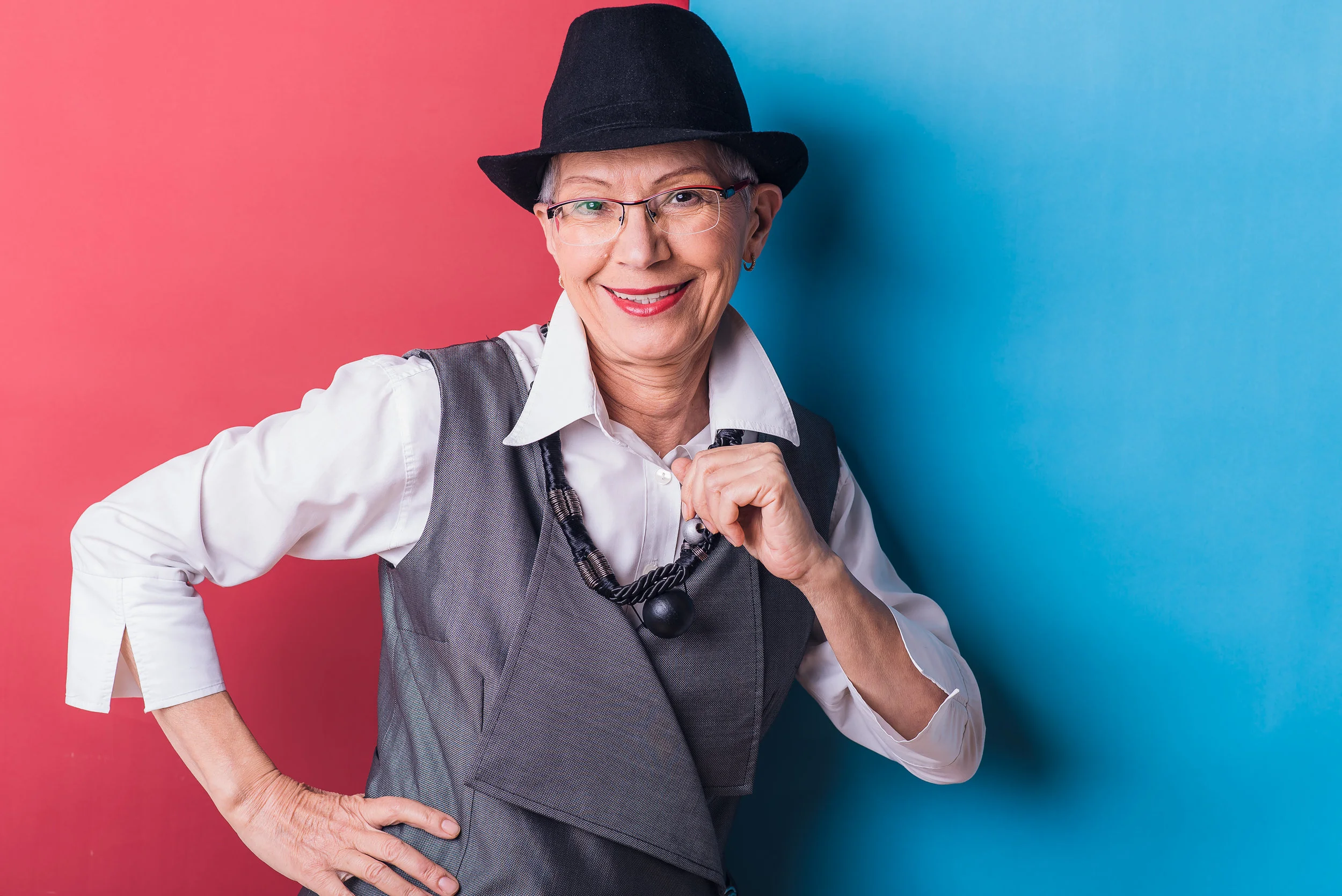Getting Older? Here Are 7 Ways to do it Well!
I came across this article in forbes.com by Erika Andersen Contributor, and enjoyed reading it so wanted to share it with you.
In 1900, the average 30 year old in the U.S. could expect to live another 35 years...in other words, to die by age 65. Today, the average 30-year-old can expect another 50 years of life; to live until age 80. And by the time those 30 year 0lds actually are 80, who knows what their life expectancy will be?
Our ideas about aging, and what it means to be over 50 - or 60, or 90 - seem to be stuck somewhere back in the middle of the 20th century. We still consider 65 (or 55, in some sectors) as standard retirement age, and we expect everyone to start slowing down and moving aside for the next generation as their age ticks past the half-century mark.
Ever since I turned 60 a few years ago, I've been realizing that these standard societal notions of what it means to be old - especially for women - just aren't applying to me. And most important, that I can craft my later years to be what I want them to be, rather than what anybody else tells me they must be.
I just read a wonderful article by Bonnie Hammer, a friend and client, at Fortune.com; an honest, feisty, bold rumination on being a 65-year-old woman in the media industry. It felt like a lighthearted manifesto (if there can be such a thing), a quick poke in our collective assumptions about aging. It really resonated for me, and made me think about how we can live the life we want, rather than the one that’s prescribed for us.
So let's get practical. If you find yourself on the AARP side of 50, and you don't want to follow the path laid down for you by society’s expectations, here are seven things you can do to age like a fine wine or a great violin, vs. a can of diet coke or a cheap car:
1. Think about yourself. I've been coaching an executive lately, an extremely bright and successful woman in her early 50s, who is realizing that she never really focused on what kind of life she wanted to create for herself. As a younger person in the work world trying to juggle a marriage, two kids, a career, an extended family, and community commitments, she spent decades just trying to do what was in front of her as well as she could. As we get older, many of us have the luxury of choice for the first time. When you don't have so many things and people clamoring for your attention on a daily basis, you can think about what you'd like the rest of your life to look like. Want to keep working? Figure out how to make that happen on your terms. Want to stop working? Figure out how to make that happen on your terms. Want to create some new version of work/not work? Figure out how to... you get the idea. Don't assume you have to do or can't do anything. Get clear about what you love and what you're good at, and make a life that you truly want to live.
tarts, "When I am an old woman, I shall wear purple, with a red hat that doesn't go and doesn't suit me." One of the truly great things about getting old is that you can, in ways subtle and grand, thumb your nose at convention with fewer consequences than when you were younger. For instance, when my husband and I got married in our mid-fifties, we did it precisely when and how we wanted. We said what we wanted to say, we invited who we wanted to invite. I felt like wearing a very wedding-ish white dress, never having done that before, and so I did. There were no parents to frown us down, and our kids may have rolled their eyes at some of our choices - but they weren't the deciding vote. And they all ended up having a grand time. It's true at work, too. A friend of mine who is nearing 60 and has always been a very by-the-book executive decided that he wanted to move south to be near his kids and grandchildren, and proposed to his boss, the CEO of their NYC-based company, that he could do his job 3 days a week long-distance and two days a week in New York. The boss said yes.
3. Use everything. Most traditional cultures revered older people as the carriers of wisdom and the archivists of the group's knowledge and experience. In the modern world - not so much. We tend to assume that any knowledge older people have is outdated or downright irrelevant, and to dismiss the value of their contributions. You, however, can think differently about this. You can value what you bring to the party. You've amassed a great deal of experience, skill, and knowledge that isn't time-sensitive: how to deal with people; how to get stuff done; how to navigate complex environments; how to teach others and support their success. And age also often brings a specific kind of wisdom: when you've seen and heard and experienced a lot, if you're a reasonably reflective person you're going to be able to extract some useful patterns from all that living, and offer those insights to those around you. You'll probably tend to be less reactive, and to be more interested in hearing what other people have to say. Even if others dismiss you, don't dismiss yourself: bring all that your life has taught you to everything you do, and you'll be able to use it to accomplish great things for many years to come.
4. Be a novice. At the same time, one of the most critical ways to stay vital as you get older is to consciously immerse yourself in learning new things. The least interesting and most calcified older people I know are those who find a comfortable spot and burrow in: doing the same things, having the same conversations, expressing the same opinions. Make a commitment to yourself to learn something entirely new on a regular basis. There's nothing like being bad at something to wake you up, shake you out of your complacency and "expertism," and then - when you start getting good at it – to make you feel as excited as a six-year-old. In the past year I've 1) learned to spin yarn, 2) started a new kind of workout, 3) begun doing a podcast , and 4) started learning viniculture. It's daunting and energizing, and I can feel my synapses firing on a daily basis.
5. Believe what's true. People assume all kinds of things about people over ___ (fill in the blank). That we can't be powerful. That we don't like social media. That we're not sexy. That we think millennials are lazy and entitled. And on and on. You don't have to buy into this. My italics are intentional: this may be the most important sentence in the entire post. It doesn't matter what anyone else assumes or believes about older people - like any other prejudice, just because these ideas are generally held to be true doesn't mean that they are true. For example, I feel smarter, healthier, more vital, creative and open than at any previous point in my life. Whether or not anyone else believes that's true (or even possible), I’m choosing to believe my own experience - vs. what others tell me I ought to be experiencing. I suggest you do the same. Whenever you hear or see something limiting or dismissive about people your age, ask yourself, "Is that true for me?" And then believe your practical experience. (By the way, this advice is also true for people of any age. I remember very clearly my mother telling me when I was about seven that “I was too young to have a headache.” It turned out I needed corrective lenses, and that she was wrong.)
6. Keep good company. I regularly spend time with people who are my age, older than me, younger than me, and a LOT younger than me. I especially enjoy the time I spend with people in their 20s and 30s – it’s exhilarating to engage with people who have grown up in such a different world than I grew up in, and to understand their hopes and fears, their assumptions and expectations. I enjoy getting a sense of how they’re different from me as a function of having 30 or 40 fewer years on the planet – and I find it reassuring and poignant to see how much we have in common. But the best thing is this: keeping company with smart, engaged, curious, loving, funny, kind people of all ages prevents me from sinking into a kind of reverse age-ism – from thinking that I’m cooler or smarter or better able to deal with the world just because I’ve been around longer. Because once you start thinking that, ironically, all the negative assumptions people make about you being an old person start coming true.
7. Have a lot of fun. My grandparents were lovely people, and they might possibly have had a lot of fun when I wasn’t looking, but I kind of doubt it. In previous generations, it seems as though people over the half-century mark were largely expected to be dignified and respectable on the upside, irascible or clueless on the downside, and not much else. One of the most powerful ways to craft your later years to be wonderful is to insist on your right to be as joyful, silly, happy, goofy, full of wonder, as enthusiastic and excited as you want to be until the day you die. And if anyone looks at you askance as you’re giggling uncontrollably, or whooping with glee – just let them know that this is what getting old looks like.
_____





